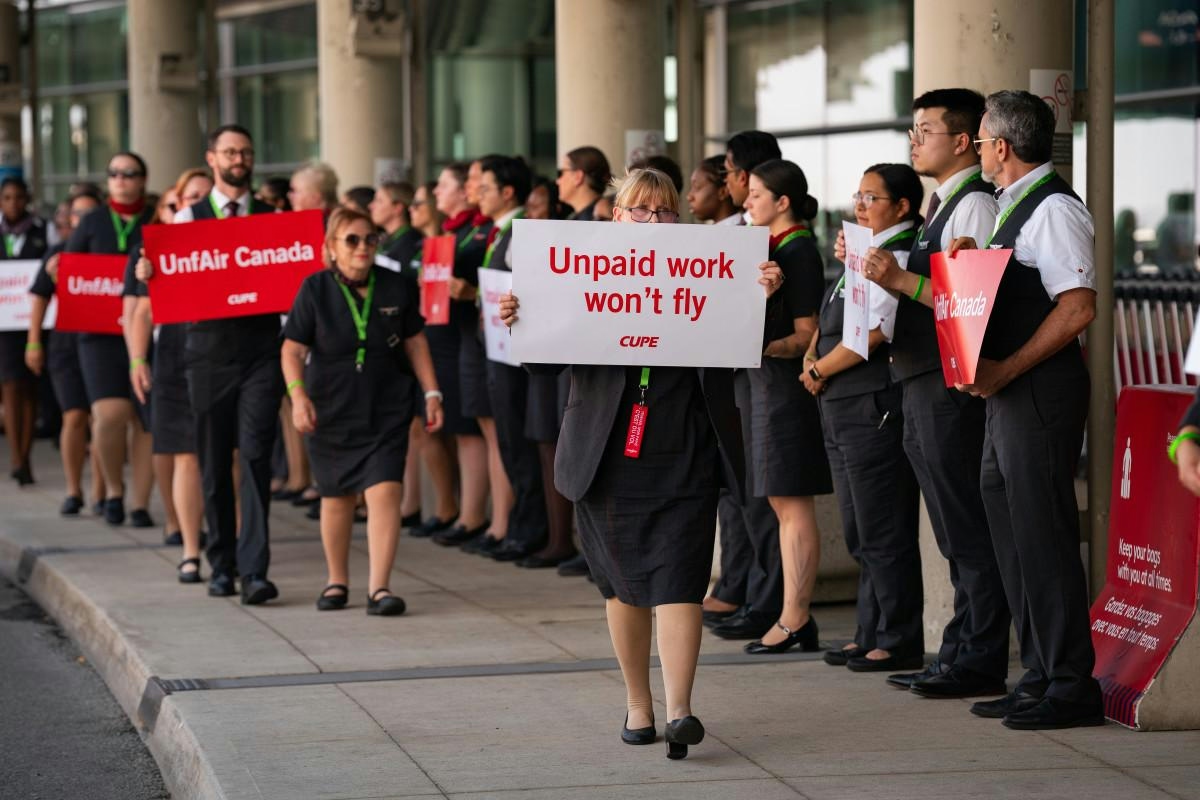エアロジニー — あなたのインテリジェントな副操縦士。
現在のトレンド
Categories
Air Canada to ground most flights amid looming flight attendant strike

Air Canada Grounds Majority of Flights Ahead of Potential Flight Attendant Strike
Air Canada has initiated the grounding of most of its flights in anticipation of a possible strike or lockout involving over 10,000 flight attendants. The airline announced a phased wind-down of its operations to be completed within three days, aiming to provide clarity to customers amid stalled labour negotiations. This move signals a significant disruption to air travel, particularly over the upcoming weekend.
Labour Dispute and Operational Impact
The Canadian Union of Public Employees (CUPE), representing Air Canada’s flight attendants, has indicated its intention to strike as early as Saturday, August 16. In response, Air Canada has prepared to lock out employees if no agreement is reached. This standoff is expected to result in the cancellation of the majority of Air Canada’s approximately 700 daily flights, with most services ceasing as early as Friday. The disruption threatens to affect around 100,000 passengers daily, including roughly 25,000 Canadians returning from international destinations who may face being stranded.
While mainline and leisure flights operated by Air Canada and its subsidiary Air Canada Rouge will largely be suspended, regional flights operated by partners Jazz and PAL are expected to continue. The strike could also impact cargo operations and have broader repercussions across the travel industry, including competitors. United Airlines, a codeshare partner, has issued a travel waiver to assist customers affected by the disruption.
Core Issues Behind the Dispute
The dispute centers on pay and working conditions. CUPE has rejected Air Canada’s latest proposals, including a new compensation package presented earlier in the week. The union contends that the airline’s offer to compensate for unpaid work is inadequate, providing only 50% of the hourly rate. CUPE further accuses Air Canada of refusing to raise flight attendant wages to align with industry standards, inflation, or even the federal minimum wage. According to the union, entry-level pay has increased by only CA$3 per hour since 2000, despite inflation rising by 69% over the same period.
Wesley Lesosky, President of the Air Canada Component of CUPE, emphasized the union’s position, stating, “For the past nine months, we have put forward solid, data-driven proposals on wages and unpaid work, all rooted in fairness and industry standards. Air Canada’s response to our proposals makes one thing clear: they are not interested in resolving these critical issues.”
Air Canada, meanwhile, asserts that it has made efforts to resolve the dispute, including requesting government-directed arbitration. CUPE has declined this approach, insisting that the company address its concerns directly rather than through arbitration.
With negotiations at an impasse, tens of thousands of passengers now face uncertainty and potential travel disruption as Air Canada proceeds with grounding most of its fleet in the coming days.

Emirates Unveils Cabin Design for New Boeing 777X

Eighteen Years On, the Airbus A380 Remains Central to a $34 Billion Airline

How a boom in luxury airline seats is slowing down jet deliveries

Navitaire Outage Attributed to Planned Maintenance

Airbus Plans Record Delivery of 870 Aircraft in 2026

DigiYatra Debuts Outside Aviation at India AI Impact Summit

Vietnam Orders Strengthen Boeing’s Commercial Outlook

Airbus Signals Uncertainty Over Future A400M Orders

JobsOhio Awards $2 Million Grant to Hartzell Propeller for Innovation Center

Collins Aerospace Tests Sidekick Autonomy Software on YFQ-42A for U.S. Air Force CCA Program
